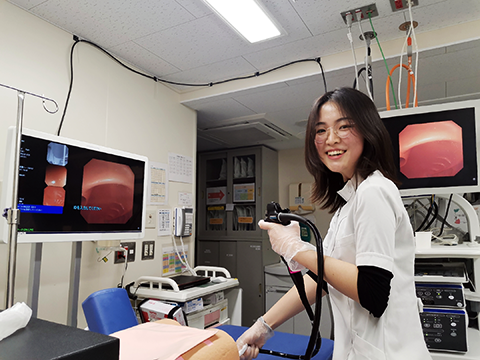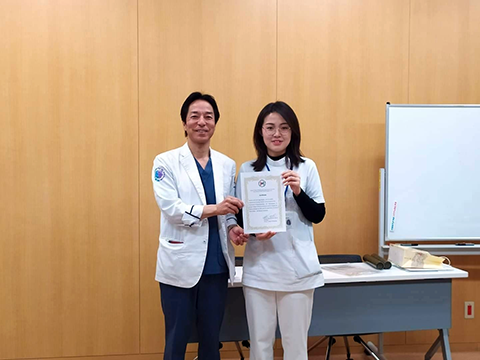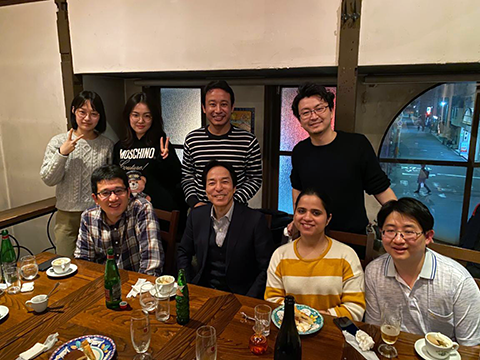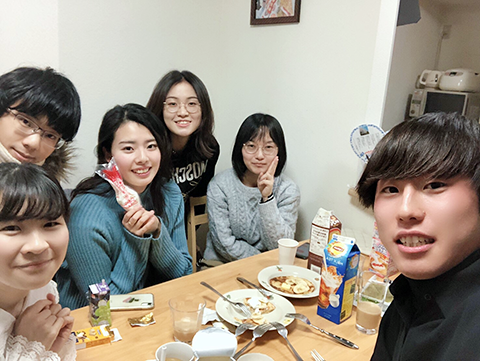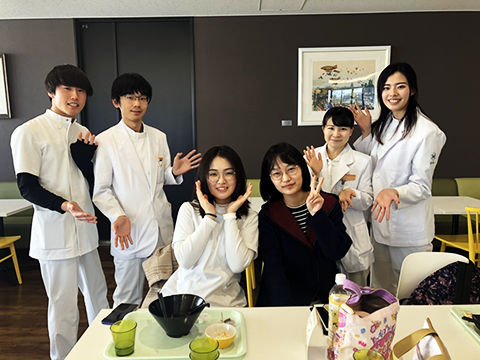国際・国内交流
杨雲蔚(Yang Yunwei)さん(中国・天津医科大学 第4学年次)
Awesome Clinical Internship at Hyogo College of Medicine
During Jan 18th to Feb 15th, I was lucky enough to be accepted as an exchange student to Hyogo College of Medicine, and spent my four-week clinical internship in Gastroenterology Department and Neurosurgery Department. As a currently 4th-year clinical medicine student, I would definitely and always describe this exchange experience as extraordinary.
Travelling around the world and explore different cultures has always been my true passion. Beautiful views, special customs, warm people, and sometimes some developed achievements are what I’m interested in. After I chose medicine as my future career, the healthcare system and clinical development became even more attractive. Thanks to my university -Tianjin Medical University, I had the opportunity to visit MGH in Boston last summer and this time, take a clinical internship and flit about Kansai.
In Tianjin, I have already finished the main clinical courses and mastered basic clinical knowledge. But I have to admit that clinical practice is totally a different situation, since treatments vary a lot in different patients. Fortunately, professors, doctors and Japanese students here are all very patient, kind and helpful and thus the four week in my dream departments was just as unforgettable.
My first two weeks at Gastroenterology department passed very fast. I believe it is because each day I was able to experience something different and learn something new. During my stay, I spent most of the time in endoscopy room, where was a totally new area for me. Although this was not my first time to see endoscope, this was really the first time for me to observe endoscopy technology in such a direct, detailed and comprehensive way. As a result, I have to search for the detailed operation procedures and videos ahead of time to get full preparation. On my first day here, I got my schedule for the 2 weeks where mentioned the names of specific examinations and operations I would see, including upper and colon endoscopy, ESD, EGD, polypectomy and many operation modes. That really helped a lot, since I would have enough time to understand how the operation was like in China before I actually saw the procedure in Japan. Before the operation, every doctor leading endoscopy took time to explain the patient’s situation and treatment plan for me in English and during the operation, they would point out some important pathological signs or operation skills they thought good for me to keep in mind.
Apart from examinations and operations, I also had the opportunity to join the case-discussing conference and weekly round. Professor Miwa and other doctors in the department were so kind to include me in these academic discussions by explaining each patient’s situation in English and pointing out some special clinical conditions and treatment plan. Due to the widely accepted and mature endoscopy technology, I was able to see many patients of early stage cancer, who can gain more initiative in treatment and have better prognosis.
One of the highlights of my whole internship is the model human endoscopy training. After observing several examinations, I was still confused of telling which part of the colon the scope was in. So Dr. Kawai brought me the model colon scope and taught me how to operate. Only when I actually operated the endoscope myself I did realize how skillful it was and that valuable memory would always be fresh for me!
My internship at Neurosurgery Department wasl another feeling- I was able to scrub in every surgery, which we considered very rare and lucky during rotations in my home university. During the two weeks in operation room and IVR center, I was able to strengthen my knowledge and memory of some common illness or operations such as cerebral aneurysm, subarachnoid hemorrhage and CEA/CAS for carotid artery stenosis. Also, I had the opportunity to saw some rare cases, like Moyamoya Disease. It’s no exaggeration to say that this department is paradise for both neurosurgeon and clinical medicine students-it has the top microsurgical equipment and mature techniques, rigorous morning conference, offering study chance for both open surgical and endovascular therapy.
This was my very first time to step in a neurosurgical operation room to see CEA and CAS for carotid stenosis, aneurysm clipping/coiling, pre-surgical coiling for cerebral tumor, brain tumor surgery and PLIF for lumbar vertebra. Every operation lasted for a long time and need great skills, patience and cooperation. But what impressed me most was the ”famous” morning conference-English only and both case review and operation plan would be clearly presented in pictures. At first, it’s not an easy task to keep up with doctors’ speech due to the complicated anatomical terms and abbreviations. Fortunately, Professor Yoshimura paid specific attention to my reaction and would draw some mode pictures on the whiteboard to make sure I can understand the treatment plan and possible risks. The atmosphere in this department was very relaxing. Everyone could feel free to air his view. Through their precise plan and serious discussion, I can feel their high professionalism and responsibility for patients. As professor once said, it is the result of patients’ lives, not surgeries or techniques that really matters. On our last but one night in Japan, Professor Yoshimura and other doctors invited me and my classmates to dinner and at that time when outside hospital, we finally felt thoroughly relaxed.
We also got connected with some Japanese students from English club or internship group in the same department and we became friends. During weekdays, we had lunch together and talked about Japanese customs and cuisines. They would give us some local advice for travelling around Kansai and recommend some delicious Japanese restaurant and snacks. I also took part in a noon discussing about the COVID-19 which was widely spread in China and other countries then. During our spare time, we had a pancake party to celebrate our friendship.
During our stay, we traveled to Osaka, Kyoto, Kobe and Koshien Stadium and enjoyed ourselves in Japanese culture.
Being a 4th-year medical student who is going to decide future major and developing road, I deeply appreciate this exchange experience. One of the most valuable lessons I’ve learned here is to keep learning and keep practicing. This internship experiences in Hyogo College of Medicine is no doubt one of my best memories and will definitely influence my future career as well as my personal perceptions.
I hope the pneumonia situation around the world gets better soon, and really look forward to meeting Japanese students from Hyogo College of Medicine in China! I believe I’ll go back to Japan again someday and I hope I can go back to Hyogo to meet you!
